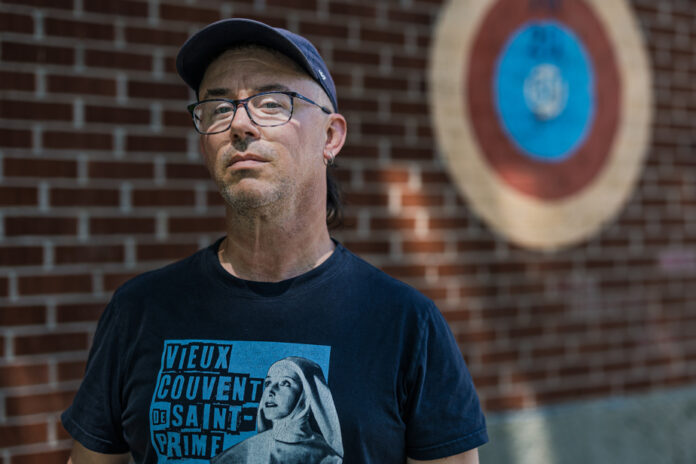(Saint-Augustin-de-Desmaures) Sitting on a bench, in the middle of the afternoon, in the courtyard of his former primary school, Keith Kouna, with his face of a veteran of the ships of the night and his hair of a celestial tramp, does not does not at all resemble the typical resident of the rather tidy suburb that Saint-Augustin-de-Desmaures is today.
But Sylvain Côté, 48, is indeed a pure product of Saint-Aug’ (pronounced Saint-Thug), a city which, as a child, carried its share of prejudices. “It was so much less developed. In the past, Saint-Aug’ was the hole. At the Polyvalente in Sainte-Foy, even the teachers disgusted the world of Saint-Aug’! » Small smirk. “But hey, today, the math teacher who called us a farmer, she stays here. »
It is the posthumous gift of his grandmother Lucina, a plot of land lying on his will for his grandson, who will quietly bring the double K back to his hometown, in 2007.
Officially the owner for a year of a real house in the city of his first bad shots, Keith Kouna, father of a 5-year-old boy, has not however metamorphosed into an obedient suburbanite, if we are to believe Metastases.
On his fifth solo album, as long and proliferating as a double disc, the singer is in turn cabaret crooner (Momies), parodist of Trenet (Les vieux qui courent), new wave necromancer (Cadavres), Baudelairian diarist ( The Narrative), lonely cowboy (Aux quatre vents), stellar rocker (C’est un bum) and wrathful victim of endemic stupidity (Les gens).
What if the White Album had been recorded by four fans of Tom Waits and the Berus, rather than the Beatles? It might have looked like this. Because like on the white album, Métastases alternates between undeniably great songs (Goodbye, American) and a series of deliberately comical ditties. Although he has a virtuoso brushstroke worthy of Géricault’s frescoes dripping with amazement and blood, Keith Kouna cannot help but sow here and there a few fabulously impertinent barbots.
It would nevertheless be unfair to reduce Metastases to its pranks, so much does this sum-work produced by Alexandre Martel find its coherence in its apparent contradictions, its share of absurd songs becoming a way of mirroring the absurdity of this life to which it would be a mistake of sometimes not sticking out the tongue.
What is freedom, according to the punk poet? “It’s doing what you want to do. Have time. Make you fun. And it’s also not being afraid of ridicule. Very early, with Les Goules [his former group], I learned that, and it allowed me everything. The world is often caught up in questions like “What will other people think?” Cuddling up helps. »
This fear of compromise that corrupts is easily understood by glancing in the rearview mirror of Keith Kouna who, in his early twenties, will leave Quebec with an open ticket for Europe. He will dabble there for several months, guided by dreams that his frequentation of the universe of Henry Miller had planted in his noggin.
Because if he played, at 15, 16, Slayer and Iron Maiden with his buddies in the basement of a disused bank in Saint-Aug’, the little Côté was also a precocious reader, who had had the books of the author of the Air-conditioned Cauchemar placed in his hands as a teenager.
Les Goules, a group born at the beginning of the millennium from the musico-ethylic delirium in which his friends plunged in the evening before going to the bar, will monopolize him for a time on his return. A long detour after which he will return in 2008 to his own repertoire, which continues to flourish on the sidelines, with his bias for the all crooked, the exploited, the sharks and the dirty.
“The idea is to last and above all not to wait for medals, money and success, observes Kouna. There is a base of self-demand that I try to cultivate, because what scares me the most is softening up, falling asleep, getting lazy, giving it easy to me. But if you stock up well, people will be there. Anyway, there have always been too well-known people who shouldn’t be, and little-known people who should be better known. »















